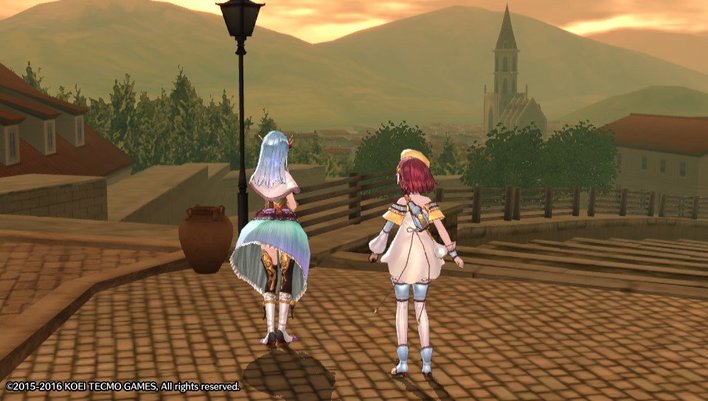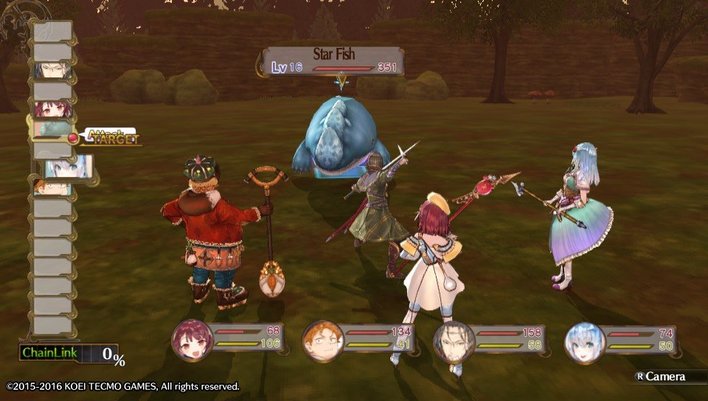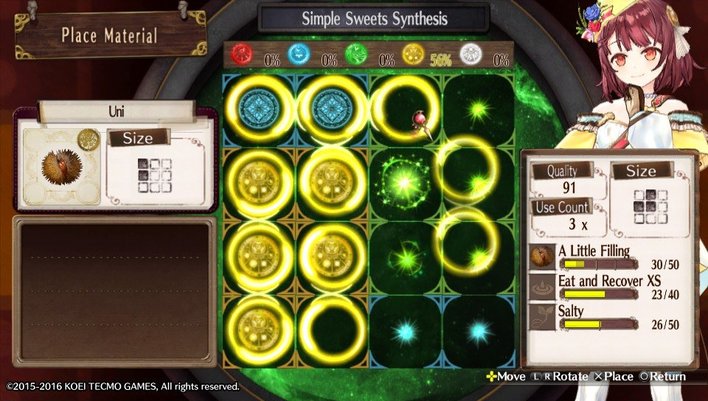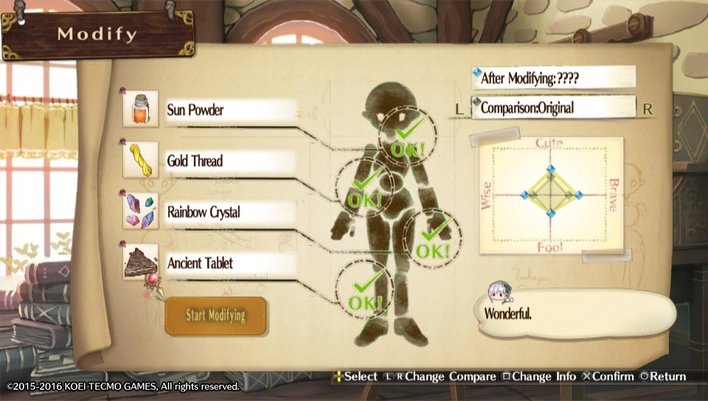If there's one thing people bemoan in video games, it's a little thing known as a 'fetch quest', where some well-meaning character will ask you to bring them half a dozen of an item from some undoubtedly remote and monster-filled location. Such a request is generally met with eye rolls, moans and groans, and people seem to genuinely resent the drudgery of rounding up and delivering items. So imagine if a whole game came along that's almost entirely about collecting, synthesising and delivering items? Well, that's essentially what long running alchemical role-playing game Atelier is about - and it's way more exciting and addictive than it sounds. So much so, we've hardly put it down since we started playing.

In fairness, a lot of our time was spent trying to get a good picture of Leon's ludicrous dress sense though...
Set in the idyllic German-inspired town of Kirchen Bell, Atelier Sophie: The Alchemist of the Mysterious Book follows the tale of the titular Sophie, a young alchemist who's inherited both her skill and atelier workshop from her late grandmother. Unfortunately, for all her optimism, little Sophie is a little lacking in the skills department, with almost everything she tries to create turning to smoke - or worse, exploding in her face. On the day she successfully manages to make a basic Berg Medicine, she decides to jot it down in a nearby book, and her life changes forever when the book comes to life before her very eyes. It turns out the book is inhabited by a spirit known as Plachta, and has a severe case of amnesia! With no one else to turn to, it falls to Sophie to try and restore her lost memories by writing alchemical recipes inside. With the help of Plachta, and a whole lot of alchemical trial and error, Sophie sets off on her adventure to become the best alchemist she can, and follow in her grandmother's footsteps.
In practice, this means that the bulk of your time in Atelier Sophie is spent in a cycle of creating various items through alchemy, then going out exploring to harvest more raw ingredients to make more stuff - and rinsing and repeating throughout the duration of the story. A story which revolves more around Sophie's relationships with her friends, and helping them out with their day to day lives, than about saving the world from imminent destruction. It's also worth noting that, as with the majority of the previous Atelier titles, the passage of time does come into play - every action you take, from synthesis to travelling to harvesting materials eats up hours and days, with certain character and story events only occurring on specific days of the week, or at a specific time of day. However, much like it's predecessor Atelier Shallie, the overall time limit - which usually meant you needed to wrap up the story in a number of in-game years - has been abolished, letting you take the whole game at your own pace. Yay!

Unfortunately, for a game that relies so heavily on time, Atelier Sophie neglects to tell you how long your trips out will take...
Atelier Sophie, like all of the past seventeen Atelier games, is focussed heavily around the magical art of alchemy, which lets you create all manner of new items from seemingly disparate ingredients. For example, lobbing some magical grass, animal bones/feathers/fins and water into a cauldron for an hour will leave you with a healing medicine, while the combination of an electrically-charged Raiden Ore, some clay and a 'neutralizer' potion, plus six hours (in game) stirring time will grant you a Lightning Bomb instead. In the world of Atelier, you 'cook' everything you need for your adventure, from the aforementioned healing potions and bombs to critical quest items, and the titular Sophie's growth from a novice at her late grandmother's knee into a great alchemist known the land over is a key part of the game.
Becoming a master alchemist is all well and good, but if you want to fill the pages of the book, and help Plachta, you'll need to get some recipes. You can't actually synthesise anything without having a recipe, and as such, earning new recipes is key to your progression through the game, and your completion of the book. As such, you have to wait for Sophie to be 'inspired' enough to come up with an idea for a new recipe, which generally involves meeting specific criteria, and deciphering the sometimes obtuse hints in the 'Recipe Ideas' section of the menu. A flowchart of all the recipes in the game, unlocking new ones requires all kinds of different 'experiences', from battling specific monsters, to synthesising items with set properties, to visiting a particular place - while others are linked to the stories of your party members, being defeated in battle or exploring until you collapse from exhaustion, amongst other things. In practice, it means there's always something new to be working towards, whether it's newly-unlocked recipes to synthesise or fulfilling other random criteria.
Of course, you won't get very far with alchemy without ingredients, and while Kirchen Bell's shops carry a small selection of items, the better and more unusual ingredients can only be found outside of town, in the surrounding forests, ruins and desert areas. Each area has a different selection of ingredients you can harvest, with a natural variation in the properties and effects of each one you pick up. But the outskirts of town are a dangerous place, filled with monsters, so you'll need to be able to stand on your own two feet in battle too. Especially as the more ingredients you harvest out in the open, the more powerful the monsters prowling around become…

That's the weirdest looking Star Fish we've ever seen
If you've ever played an Atelier game before, Atelier Sophie's battles will be instantly recognisable - turn-based affairs, where both friend and foe take it in turns to attack, defend and sling spells (and in Sophie's case, alchemised bombs et al too), they're pretty easy to pick up and play. The difference however is that you can now choose to set your characters into one of two different stances, each with their own advantages and disadvantages in battle. The cunningly named 'Offensive' stance increases the damage you deal to enemies, while 'Defensive' reduces the damage you take from attacks - so far, so Ronseal - but there's a bit more to stances than that. Atelier veterans may be familiar with Support Attacks and Support Guards, where you can choose to have allies leap in and execute follow-up attacks, or jump in front of you to absorb damage in your place. In Atelier Sophie, the two are tied to the different stances, and the moves are now automatic - so when you're in a Defensive stance, you'll automatically activate Support Guards, while Support Attacks can only trigger when in an Offensive stance. Previous games have let you choose when to activate a support guard or follow up support attack, which lets you be a bit more strategic in battles, but for Atelier Sophie, you're effectively relying on the game to do it for you, which can be a bit hit and miss at times, unfortunately. Being able to throw a team mate in to absorb damage for you was an invaluable tactic, but now we can't choose when to do it, it makes things a bit more awkward - we lost count of the number of times the (admittedly rather fragile) Corneria got knocked out by a group of enemies with a vendetta, to the point where we basically stopped using her in battle altogether.
Once you've unlocked your recipe, and gathered and chosen your ingredients, you can get to alchemy-fying them - but there's a bit of assembly required. Some recipes will only give you vague categories of items you need to include, such as 'paper' or 'animal', while others require very specific items, meaning mixing, matching and experimenting with what goes into your creation is part of the fun, and the best route to creating the very best items. Each ingredient has different properties and effects which can be carried over to the finished product too, letting you produce healing potions that also cure poison, or a bomb that burns its target, continuing to deal damage to your target long after the explosion has passed. It may sound a bit daunting at first, with a sea of traits, effects and qualities to try and wade through, but in no time you'll be making killer concoctions, with tailor made effects to fulfil quests, improve your equipment and give you the edge in battle.
When it comes to actually putting your creation together, you have to bung the ingredients into your cauldron - and even this gives you room to experiment. Every ingredient you pick has a certain size and shape associated with it, kind of like alchemical Tetris pieces, and the inside of your cauldron is conveniently grid shaped. By placing the ingredient pieces on the grid, you can tweak the item's properties even further - our current strategy is to try and pick as many of our ingredients from the same elemental 'family' as we can, which lets us exploit huge bonuses when the whole grid is filled with 'blue' pieces, for example. It may not sound it on paper, but generally, the new Tetris-style alchemy system is a lot more straightforward than previous games - which we're not entirely sure we understand even now, umpteen games later. In Atelier Sophie, we've managed to wangle a fair few top-tier creations with a little playing around and repositioning, and a lot less guesswork than in previous games - something which comes in handy for completing certain quests, that require a top-tier item.

Notice how all our ingredients are yellow - which means all three of the bars on the right will get boost when finished, making one mean set of Simple Sweets.
As always, there's a few more bits and pieces you can do when you're not busy battling, harvesting and alchemising too - Meister Horst's Cafe in town has a requests board where troubled townsfolk can post their pleas for help. Being the charitable sort, Sophie and her crew can take on these requests for monetary rewards, which generally take one of two forms - either pleas to defeat certain monsters or folk asking for specific items. Horst will also tell you about any interesting rumours he's heard (for a fee of course), which detail locations of rare monsters or spots where unusual alchemy ingredients can be harvested. It's not immediately obvious, but some of these rumours are particularly important, as they relate to the monsters that some quests will ask you to defeat - so without buying said rumour, the monster in question won't show up on your map, making the request impossible to finish within the time limit.
You're also able to buff up your weapons and armour, and create new ones, with the help of town blacksmith Logy (of Atelier Escha & Logy fame) and resident clothier Leon - providing you can alchemise them the raw materials, complete with any interesting effects and bonuses you might want carried over. Another interesting feature, unlocked quite a way into the game, is 'Doll Make', which lets you craft new bodies for Plachta to inhabit - because who wants to stay trapped in a book forever? Like with alchemy, you pick your constituent ingredients, each of which alters four different personality traits, and lets you unlock new outfits for Plachta, each of which has different strengths and weaknesses in battle. It's not as deep a system as alchemy, but it's well worth playing around in, if only to see what different outfits you can unlock.

Different Plachta 'outfits' have different effects in battle.
Atelier Sophie's slow-paced, coming of age story and emphasis on crafting won't be to everyone's taste, but for those whom it clicks with, they'll likely find themselves wiling away many an hour gathering, battling and alchemising, as you strive to unlock all the recipes, and complete the book. It's new streamlined alchemy system removes some of the confusion of previous instalments, and the lack of time limit makes it much more accessible for newcomers. However, we would have appreciated a bit more control in battles, as being able to have another party member act as a damage sponge for an injured team-mate is particularly useful, and something that could have saved our (or at least Corneria's) bacon more than a few times.
Format Reviewed: PS Vita



















